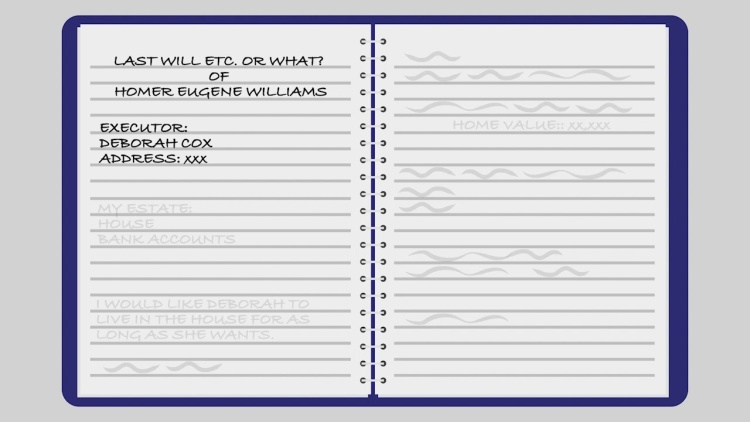In re Estate of Williams
California Court of Appeal
155 Cal. App. 4th 197 (2007)
- Written by Angela Patrick, JD
Facts
Homer Williams had two children, Eric Towle (plaintiff) and Gail Towle, with his first wife, Virginia Towle. After Virginia remarried, Williams had only intermittent contact with his biological children. Williams also remarried and had a stepdaughter, Deborah Cox (defendant). Williams was very close to Cox, but he never formally adopted her. After Williams’s second wife died, Cox moved in with Williams and took care of him until he died 17 years later. Williams told Cox that she would get his house when he died. However, at his death, Williams’s closest living legal relatives were his biological children. Without telling Cox, the Towles had Williams cremated and never held a funeral. Eric petitioned to administer his father’s estate, claiming that Williams had died intestate, i.e., without a will. Cox found a handwritten document in Williams’s desk and submitted it as his holographic will. The document was titled “Last Will, Etc. or What? Of Homer Eugene Williams,” and it appointed Cox and another relative as executors, listing their full addresses. The document gave some personal property to a nephew, gave power of attorney to Cox, stated that Williams did not want to be put on life support, listed his assets, identified his house as worth between $225,000 and $350,000, and stated that Williams wanted “Cox to be able to live in the house as long as she wants before putting it up for sale.” The document did not include a cursive signature, date, or anything else. The house was worth approximately $700,000 at the time of Williams’s death, indicating that the document had been written many years earlier. After hearing evidence, the trial court accepted the document as a holographic will and made Cox the estate’s executor. Eric appealed.
Rule of Law
Issue
Holding and Reasoning (Bamattre-Manoukian, J.)
What to do next…
Here's why 907,000 law students have relied on our case briefs:
- Written by law professors and practitioners, not other law students. 47,100 briefs, keyed to 996 casebooks. Top-notch customer support.
- The right amount of information, includes the facts, issues, rule of law, holding and reasoning, and any concurrences and dissents.
- Access in your classes, works on your mobile and tablet. Massive library of related video lessons and high quality multiple-choice questions.
- Easy to use, uniform format for every case brief. Written in plain English, not in legalese. Our briefs summarize and simplify; they don’t just repeat the court’s language.





